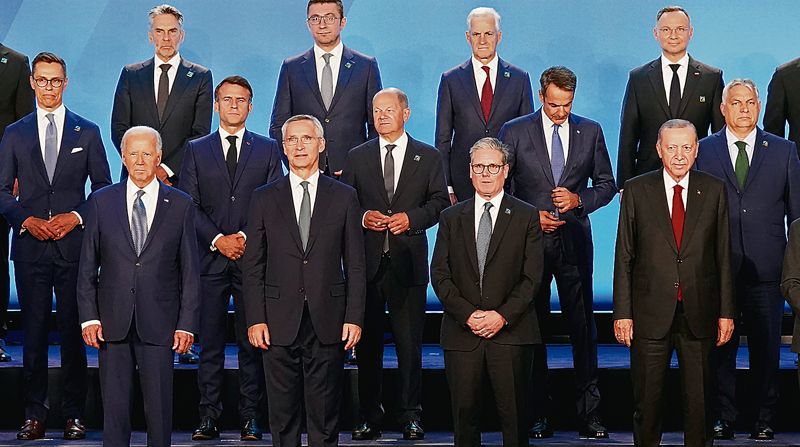Indo-Pacific at the core of NATO’s strategic realignment
THE just-concluded NATO summit in Washington marked the alliance’s 75th anniversary. With its historical context, this milestone summit has raised significant hopes and aspirations for extensive engagement amid the complex issues that have emerged in the past two years. Discussions revolved around the allies’ collective support for Ukraine and defence expenditure, a divisive and thorny subject. However, members also discussed an issue of considerable importance to India — NATO’s strategic pivot towards the Indo-Pacific.
The Indo-Pacific region is crucial for global economic growth, technological innovation and geopolitical activity. With over half of the world’s population and significant global trade passing through its waters, the region’s stability is paramount to international security. As threats evolve, NATO’s focus, traditionally on Europe and North America, is also shifting, recognising the importance of the Indo-Pacific.
It began with NATO’s engagement with Australia, Japan, South Korea and New Zealand, collectively known as the Indo-Pacific Four (IP4). NATO has been collaborating with these nations since the early 2000s. However, conflict between Russia and Ukraine, security threats from China and a resurgence in global strategic contention have intensified these partnerships. As the Russia-Ukraine conflict continues and the US-China competition remains fierce, NATO can significantly enhance its strategic position through cooperation between its allies and partners in the Euro-Atlantic and Indo-Pacific regions.
The IP4 group, an informal yet powerful alliance, is expected to remain a key NATO mechanism for addressing mutual interests in the foreseeable future. This alliance enables NATO to unite its member states with like-minded partners from the Indo-Pacific region. Unlike NATO’s formalised regional partnerships, the IP4 is more unofficial. With its inherent flexibility and the reduced risk of China reacting negatively to what it might perceive as an Asia-Pacific NATO, this informality brings unique benefits to the alliance.
The NATO summit saw the continuing involvement of Indo-Pacific partners, underscoring the importance of their cooperation in addressing shared security challenges. Focus areas include cyber defence, technological advancements and the security implications of climate change. The collaboration extends to countering hybrid threats and bolstering maritime security. NATO is expanding defence industrial cooperation with Indo-Pacific partners, aiming to leverage the production capacities of countries like Japan, South Korea, Australia and New Zealand to manage challenges posed by strategic competitors effectively. Additionally, four new flagship projects were identified for collaboration, encompassing support for Ukraine, enhanced cooperation on cyber defence, exchanging information on challenges posed by disinformation and engaging in expert discussions on artificial intelligence.
NATO and its allies recognise the importance of placing the conflict in Ukraine within a global context. Since early 2022, NATO has acknowledged Europe’s historical role as the centre of global power dynamics and the Indo-Pacific as the primary arena for competition. The recent NATO meetings in Madrid and Vilnius signalled a shift in focus to recognise Europe’s increasing interconnectedness with global strategic dynamics. However, embracing a more global perspective faces significant challenges, with many European allies advocating for maintaining NATO’s focus on safeguarding the Euro-Atlantic region.
NATO’s Indo-Pacific partners prefer the alliance to focus on securing Europe, allowing the US to concentrate more on Asia independently. Concerns about the perception of NATO’s expansion into the Indo-Pacific, driven primarily by China, highlight diplomatic sensitivities and strategic perceptions. NATO is carefully working to enhance cooperation in the Indo-Pacific, considering historical and geopolitical factors. The focus is on cybersecurity, climate security and the need to address power competition and strengthen deterrence capabilities.
As the NATO summit concluded in Washington, the alliance iterated the need to integrate its Indo-Pacific partnership agenda with the alliance’s core mission: reinforcing deterrence against significant power revisionism.
The growing interdependence between NATO and IP4 is due to two critical aspects. First, IP4 nations provide NATO with a dynamic defence industrial base. As the Russia-Ukraine war drags on, NATO’s Euro-Atlantic allies are on the verge of depleting their cache of weapons and other military equipment. The IP4 allows NATO to develop batches of weapons and military equipment to keep the Russia-Ukraine conflict going, thus allowing their Euro-Atlantic allies to catch on. For instance, Australia has stated in its 2024 Defence Strategic Review that it aims to develop domestic missile manufacturing capabilities. Along with Pillar II of AUKUS, NATO is provided with the development of an Indo-Pacific military-industrial complex. Second, the foreign policy outlook of the IP4 is more pro-West. The IP4 has an inclusive approach to the Indo-Pacific and international security, and their reservations for decoupling from China are in tune with the preferences of their European allies.
And yet, there are limitations to what NATO can do in the Indo-Pacific. Creating an Indo-Pacific military complex will only cause regional destabilisation, leading to China seeing NATO as a threat to its Asian sphere of influence. Also, there is a lack of consensus between the IP4 and NATO regarding China. Additionally, non-NATO nations are suspicious of NATO influence in the region as, for decades, it has only been concerned with the security of the Euro-Atlantic. These uncertainties will emerge as an obstacle to further strengthening the relations between NATO and the IP4 regarding the challenges pertaining to the Indo-Pacific. Thus, even though NATO aims to use the Indo-Pacific for arms development and procurement, strategic partnerships between the IP4 and NATO will revolve around maintaining deterrence and a rules-based order in the region and having stable relations with the West.









